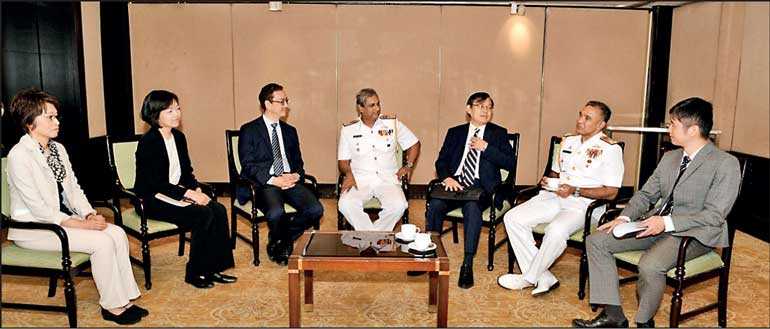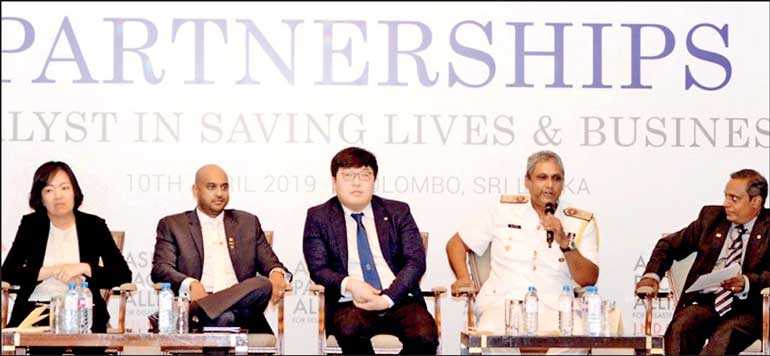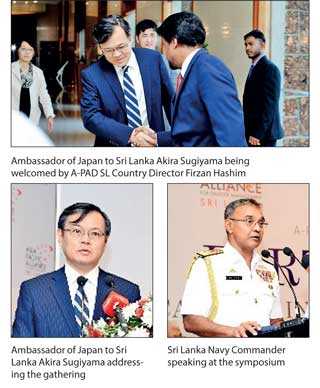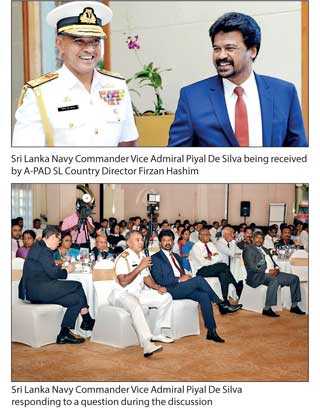Saturday Feb 21, 2026
Saturday Feb 21, 2026
Wednesday, 24 April 2019 00:00 - - {{hitsCtrl.values.hits}}



Asia Pacific Alliance for Disaster Management, Sri Lanka (A-PAD SL) hosted its 5th Annual International Symposium on the theme “Partnerships: A Catalyst for Saving Lives and Businesses” on Wednesday, 10 April at the Cinnamon Lakeside Hotel in Colombo. The event was graced by the Ambassador of Japan to Sri Lanka Akira Sugiyama, Sri Lanka Navy Commander Vice Admiral Piyal De Silva and A-PAD Chairman Faisal Djalal. In  attendance were representatives from the Government, private sector, UN, I/NGOs, A-PAD member countries, and the Tri-Forces of Sri Lanka.
attendance were representatives from the Government, private sector, UN, I/NGOs, A-PAD member countries, and the Tri-Forces of Sri Lanka.
The aim of the symposium was to provide insight into sharing of best practices both locally and internationally. The importance of partnerships was highlighted through the address made by the Chief Guest Akira Sugiyama, saying, “partnerships surely add strength and effectiveness to disaster response and relief” as well as in the address by the Guest of Honour Vice Admiral Piyal De Silva, who stated, “Natural disasters have a direct impact on sustainable development and countries’ debt rate; therefore a robust mechanism should be in place during a catastrophe to effectively mitigate the impact of natural perils and to continue with economic activities to maintain production levels.”
The main aim of the event was attained through two panel discussions on Forging Bonds in Saving Lives: Civil Military Cooperation (CIMIC) and Ambitious Coalitions: Disrupt Industry Norms for Sustainable Development.
Moderated by Anil Kulasuriya of Unilever Sri Lanka Ltd., the first panel discussion addressed the best practices on the partnership between the Sri Lanka military and civil organisations in saving lives. Sri Lanka Navy Operations Director General Rear Admiral Niraja Attygalle, addressed the importance of civil military partnership in terms of sharing knowledge and resources as well as technical support. Airbnb Global Response and Relief Partnerships Manager Airbnb Asia Pacific and Airbnb Asia Pacific Disaster Response and Relief Lead Saleha Ali provided insight to their role in encouraging hosts to make their houses temporarily available to those who have been affected by disasters. 
The second panel discussion highlighted the importance of multi-stakeholder networking to engage easier, faster and more efficiently in disaster risk reduction, preparedness, response and recovery through the coordination and consolidation of a number of networks.
Masataka Uo of A-PAD Japan shared insight to Japan’s journey in business resilience and how it may be applicable to Sri Lanka followed by Ministry of Disaster Management Disaster Management Centre Director Anoja Seneviratne shared her view on the need for robust infrastructure in Sri Lanka.
With the participation of more than 200 stakeholders from all sectors, A-PAD Sri Lanka concluded a successful symposium, taking into account various suggestions and ideas by the discussion panellists as well as the participants.